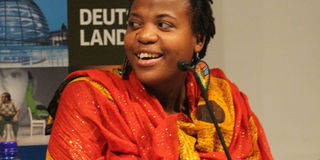You should judge me by what I write,not by my gender

Novelist Zukiswa Wanner at a literary event. PHOTO | FILE
What you need to know:
- Literature, despite the fact that a majority of book buyers are women and there are many leading writers who are female, still maintains serious commentary only from men.
- So if Aminatta Sow-Fall or Tsitsi Dangarembga are at an event and they do not smile, they are unfriendly and have a bloated sense of importance. If JM Coetzee or Wole Soyinka does it, they are contemplative and reserved.
- With the unnecessary investigation, The New York Review of Books may very well have silenced one of the best contemporary writers because she had chosen to make it about her work and not about her.
True story. Some years ago while I was still staying in Johannesburg, I got a phone call from a stranger. I answered.
“May I talk to Zukiswa Wanner?” He requested.
“This is she,” I answered.
“Oh?” He said sounding surprised, “You are a SHE?”
“Well Zukiswa is a woman’s name so err…” I left that hanging, then asked, “who am I talking to please?”
So the man introduced himself. He was a friend’s husband and had got my number from her phone. Sounds a bit creepy and yes, I am judging. She had mentioned me many times. A few days prior while bored — he had to mention this — he picked one of my books from the bookshelf. While he did not read fiction normally, when he did, he did not read women writers.
But on this particular day, he found himself reading Men of the South and found the issues I addressed right up his alley. When he completed reading the book, a few hours ago, he could no longer be sure that I was a woman. “I mean, you write men very well, I knew all those guys. You write as good as any male writer I have read, better than some even. So I was calling you to say ‘good job and well done.’”
When he finished speaking, I almost cried for every second of my life I had remained holding on that phone call.
UNNECESSARY INVESTIGATION
As a sign of his privilege, this man who was my friend’s husband but who I had never met, not only violated his wife’s privacy probably out of some jealousy. He also called me, and then when he realised that I was in fact a woman as his wife had told him and my name was not a pseudonym, I should be grateful that I write well — like a man.
This was an example, though some may choose not to see it as such, of how patriarchal people read literature. And sexism in literature is pervasive. For some reason, women cannot just make it on their own merit. So if Aminatta Sow-Fall or Tsitsi Dangarembga are at an event and they do not smile, they are unfriendly and have a bloated sense of importance. If JM Coetzee or Wole Soyinka does it, they are contemplative and reserved. In fact, a lot of the commentary on the now old Aidoo misspelling saga had some “who does this woman think she is” sort of commentary.
So when the news came out that a leading literary publication, The New York Review of Books, had done an investigation on the real identity of the author whose pseudonym is Elena Ferrante, I was saddened but not surprised. Ferrante has been known for writing such works as My Brilliant Friend and Those who Leave and Those Who Stay, which trace the lives of two very self-aware female characters. She has also guarded her identity and has stated that if people got to know her who she is, she would stop writing.
And with the unnecessary investigation, The New York Review of Books may very well have silenced one of the best contemporary writers because she had chosen to make it about her work and not about her. As my friend Troy O pointed out in showing the difference in treatment between male and female writers, Thomas Pynchon who is reclusive and has kept his identity a secret since the 1960s, has never had this similar violation from any publication, including tabloids. The world seems to respect his wishes.
DOUBLE STANDARDS
Why am I not surprised? Because literature, despite the fact that a majority of book buyers are women and there are many leading writers who are female, still maintains serious commentary only from men.
In this field, whatever Dr Wandia Njoya has to say is rarely considered as relevant or as important as her male counterparts despite her qualifications and credibility.
While patriarchy is not nearly going to end tomorrow, perhaps the writers and the readers among us owe it to ourselves and those who read to become more aware and question or stop some of these behaviours. Speaking for myself, every time I sit in front of my laptop, my aim is not to best other black
African female writers in the same way I do not aim to best anyone but myself. My aim is to write a good piece of literature, for all readers. I am aware, too, that not everyone will like my writing style but that is okay. Not everyone likes vanilla ice-cream. But to decide that my work or any writer’s work will not be judged on its merit but rather on the gender of the writer is warped in many ways. Here is hoping it stops in my lifetime. But I am not holding my breath.





